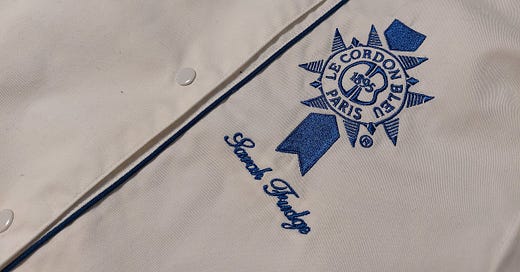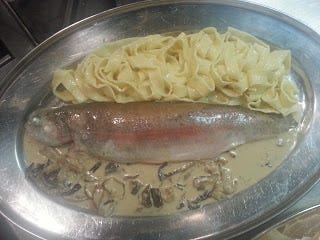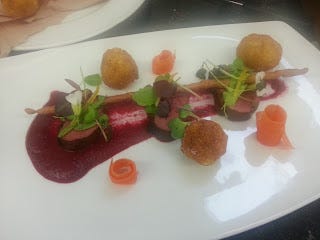Even before I went to culinary school I was a fan of Anthony Bourdain. His writing style was brilliant: the prose vivid, the images evocative, and his insights into culture and the human condition fascinating. He also didn’t mince words about the restaurant business.
In one of his books (Medium Raw, I think) he cautioned anyone thinking of changing careers mid-life to become a chef. To call it a caution is a bit of an understatement – he pretty much told anyone thinking about it that they are f*cking crazy. The hours, the crappy pay, the hard living, and the physical wear-and-tear are all good reasons to enjoy being a home cook and leave a kitchen career as a pleasant reverie.
I read it, understood it, agreed with it, and did it anyway. Why? Because I’m like that.
My life as a chef only lasted a few years but they were some of the most interesting and satisfying years of my career. The work was hard for sure, but it was fulfilling in ways that no office job ever was – I’d come home dirty, tired, and smelling of onions but there was a sense of accomplishment – seeing produce become product become cash in the till was awesome. There is nothing like walking into a clean, organized, well-stocked walk-in fridge – I get the warm fuzzies just thinking about it.
That said, Bourdain was right. The hours sucked, especially as the parent of a young child. The pay was not great – it was enough to live on, but not much more. Daycare closures or a sick kiddo meant a lost day of pay. Staying home when I was sick – ha! Doping myself up with decongestants and painkillers and hauling ass to work was more like it. It was a recipe for burnout.
Do I regret it? Heck no. It was a great experience that’s become a big part of who I am. It changed the way I think and see the world, I made some great friends, and oh yeah, I can really cook!
But would I recommend it? If you’re young and healthy, don’t mind being broke, have no dependents, and have a serious passion for food, sure! If you’re over 30, have a family, like nice things, and have even one joint in your body that doesn’t work the way it should you might be in for a rude awakening.
Many people who love to cook have a culinary school like Le Cordon Bleu on their bucket list. Learning to cook with esteemed professional chefs, learning all the secrets, and wielding some serious knife gear sounds like a lot of fun, but does it live up to the fantasy? What’s it like? Is a professional culinary school worth it?
Let me fill you in on what it’s really like and what you really learn. It might surprise you.
Everyone is going to be younger than you. If you are older than 30 everyone in your culinary school class will look like teenagers and some of them will not be old enough to drink in the wine tasting seminar. You may earn an affectionate nickname like “Grandma”.
It’s going to be expensive. Tuition is going to run you in the mid five figures, plus the opportunity cost of the income you’re foregoing to take on 10 months of full time study.
Classes are INTENSE. School days are long and busy with two or three hour long practical classes in the kitchen preceded by demonstrations and lectures that last just as long. Breaks between classes are short with little more than time to pee and change your apron. You watch a chef make a dish and minutes later you’re in front of the stove trying to replicate it. There’s no time to think (or overthink) – you see, you do. Over and over.
You’ll get used to criticism. Adults have been away from school and the constant cycle of grading and evaluations long enough as to be “re-sensitized” to high levels of scrutiny. Even if you’re there just for fun there’s a stress level about the money spent and a fear of looking inept in front of your teenage peers. The last five minutes before you present your plate to the chef for tasting are full of panic and sometime your dish will miss the mark. You’ll get used to it.
You can’t bullshit. A plate is a flat, empty surface with nowhere to hide. Chef instructors are masters of detecting flaws in technique and flavour. They have made these dishes dozens of times, seen absolutely every possible mistake, and know precisely what you’re attempting to hide under a sauce. Consider yourself busted before you even start.
You will do an awful lot of laundry. Cooks whites need to be clean at all times because dirty clothes = kicked out of class = missing the class = grade of zero.
You will get fat. If you’re in a pasty program you will be bringing a cake home almost every day. In cuisine you cook rich dishes with lots of butter, cream, starches, and veal stock. Since you’ve just spent all day in the kitchen you aren’t going to be enthused about cooking dinner, so guess what’s for dinner?
You will get your shit together. You will find all the weaknesses in your executive functioning skills and will either improve or die. Always running late? Not anymore. Forget things at home? Nope. Procrastinate? Kicked that habit. You’ll be learning so much in such a short period of time that you’ll automate the basic habits you need to get through the day.
You’ll find your voice (and your muscles). If you’re shy and delicate you’ll have an awful time. You’ll have to shout over fans and racket, crack bones with a cleaver, kill lobsters, drag around a heavy knife roll, and when the elevator from the basement kitchen breaks down you’ll be part of the human chain carrying heavy bins of produce up eight flights of stairs.
You’ll learn to cook, but few recipes. This is less true in pastry programs where you learn a lot of classics, but it’s sure true in cuisine. There are lots of recipes that are great for practicing specific techniques like Frenching bones or making consommé, but the recipes themselves can be really old-school and unfashionable. How about this glorious poached trout in aspic?
Or this fussy monstrosity known as Chartruese de Riz de Veau (veal sweetbreads in a meat stuffing)?
Or this weird combination of trout (what’s with the trout?), mushrooms and fresh pasta?
You’ll try new ingredients and reinvent familiar ones. Ever cooked salsify or guinea fowl? You will. Potatoes in the mystery box for the fourth time this week? Thankfully there are countless ways to cook a potato and you’ve done them all: forget roasted and mashed and consider Pommes Duchesse, Pommes Anna, or a Gratin Dauphinois. You’ll get familiar with the staple ingredients that are always available in class and use the techniques you’ve learned to combine them in different ways. Flour, eggs and butter become a quiche one day and a pasta dish the next day. Necessity (or a cranky chef instructor) becomes the mother of invention.
You’ll appreciate dining out. Once you know, you know. You’ll notice things like quality knife skills, well-made sauces, and unique flavour combinations. You’ll appreciate what’s going on behind the scenes and the work that goes into each plate. You’ll be more forgiving of minor flaws and more critical of truly shoddy workmanship. You’ll be happy to part with your money for great food and take cheap meals for what they are. You’ll know when food was made with love.
You’ll be really proud of yourself. Some days, near the end of your course mostly, it will all come together. You’ll manage to be organized, creative, and technically adept all at the same time. The gods of the production kitchen will smile on you and put more than just turnips and potatoes in the class mystery box. And you’ll make something like this:
And when you’ve sweated the exams and the evaluations you’ll be a darn good cook. You’ll know more about food than you ever dreamed, but be acutely aware of how you’ve only scratched the surface. You’ll be able to skim a recipe and know exactly what techniques it uses. You’ll look at lists of ingredients and know what you can skip and what you can substitute. You’ll be able to look in your fridge and find something to make for dinner even if you only have an onion, an egg, and some stale bread. And whether you’re wielding the tongs at a family BBQ or wrestling a turkey for the holidays you’ll hardly break a sweat.
If you want to make a career in the kitchen then culinary school is a great idea. You’ll have the foundations and have had a trial by fire. For the home cook who enjoys music and a glass of wine or two while stirring an excellent risotto? Probably not. Invest in some great cookbooks, learn techniques instead of recipes, be willing to try everything, and stay curious. Take pride in your cooking and do it with love – that’s all you really need.








I have often wondered. Now I know.
Very well written.
Thanks